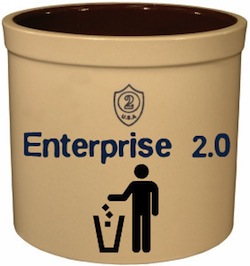 A panel at the Enterprise 2.0 conference in San Francisco today tackled the juicy-sounding topic “Is Enterprise 2.0 a Crock?” The speakers fired back against a piece from August by ZDNet’s Dennis Howlett declaring, “Enterprise 2.0: What a crock.” They delivered some interesting, but disappointingly similar-sounding, defenses of how technologies like blogs, wikis, and social networks can benefit big companies.
A panel at the Enterprise 2.0 conference in San Francisco today tackled the juicy-sounding topic “Is Enterprise 2.0 a Crock?” The speakers fired back against a piece from August by ZDNet’s Dennis Howlett declaring, “Enterprise 2.0: What a crock.” They delivered some interesting, but disappointingly similar-sounding, defenses of how technologies like blogs, wikis, and social networks can benefit big companies.
The panelists said that one of the hurdles to convincing enterprise-scale organizations that these new tools are worth their money is the difficulty in quantifying the business benefits. It’s hard to calculate an exact return on investment when it comes to better collaboration: “When somebody figures that out, they’ll make a million,” said Greg Lowe, social media architect and program manager at Alcatel Lucent.
But the inefficiency of older technologies has a real cost, said Megan Murray, community manager/project coordinator of Booz Allen Hamilton. She said her company once calculated that all the time wasted by an email that was sent to thousands of employees, where many recipients hit “reply all” to unsubscribe to the mailing list, was worth a total of $250,000. That number is only “an indicator” of the huge amounts of money that could be saved by adopting Enterprise 2.0 tools, she said.
Murray also argued that regardless of what skeptics say, company workforces are already adopting a new technologies: “That’s happening, period. These [Enterprise 2.0] technologies are simply allowing us to get that done smarter, faster, better, now.”
More broadly, the panelists identified five principles when it comes to bringing these applications into enterprises:
- Workforce transformation
- Business process/operations
- Intellectual property/privacy/governance
- Religious wars (technology/generational bias)
- Bottom-line business benefits
I’d elaborate on how those principles are supposed to tie into Enterprise 2.0, but I found a lot of that discussion rather vague. That’s a general frustration I (and others) had with the panel — there was little direct engagement with the skeptics. Is it any surprise that a bunch of social media consultants and community managers would argue in favor of social, collaborative tools? I would have liked to hear fewer “Yay collaboration!” homilies and more specific responses to criticism. Even when the speakers offered real examples, they tended to involve “knowledge-based” industries, which is the one area where Howlett acknowledged Enterprise 2.0 really makes sense.
With that in mind, I’ll close with a quote from Howlett’s piece:
Therein lies the Big Lie. Enterprise 2.0 pre-supposes that you can upend hierarchies for the benefit of all. Yet none of that thinking has a credible use case you can generalize back to business types – except: knowledge based businesses such as legal, accounting, architects etc. Even then – where are the use cases? I’d like to know.
[image:flickr/mikomatsumura]
VentureBeat's mission is to be a digital town square for technical decision-makers to gain knowledge about transformative enterprise technology and transact. Learn More
